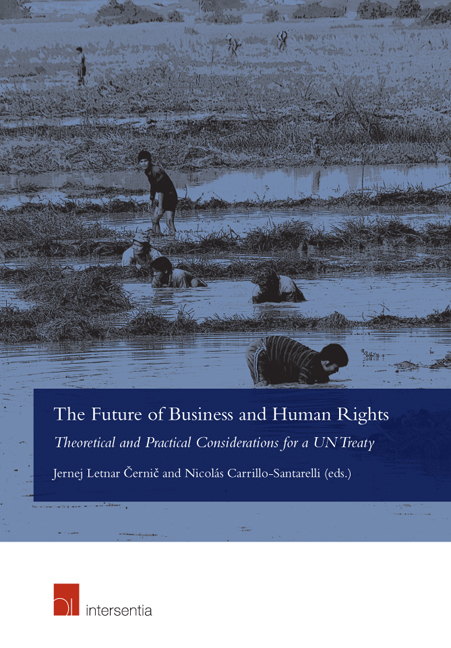Book contents
- Frontmatter
- Dedication
- Acknowledgements
- Contents
- About the Contributors
- Introduction
- Part I The Convenience and Possibility of Adopting a Treaty on Business and Human Rights
- Part II Critical Analyses Of A Treaty On Business And Human Rights
- Considering a Treaty on Corporations and Human Rights: Mostly Failures but with a Glimmer of Success
- ‘Band-Aids Don't Fix Bullet Holes ’: In Defence of a Traditional State-Centric Approach
- Voluntary vs. Binding: Civil Society's Claim for a Binding Instrument
- Part III Regional Approaches
- PART IV Lessons from other Regimes of International Law
- Conclusion
- Index
Voluntary vs. Binding: Civil Society's Claim for a Binding Instrument
from Part II - Critical Analyses Of A Treaty On Business And Human Rights
Published online by Cambridge University Press: 11 October 2018
- Frontmatter
- Dedication
- Acknowledgements
- Contents
- About the Contributors
- Introduction
- Part I The Convenience and Possibility of Adopting a Treaty on Business and Human Rights
- Part II Critical Analyses Of A Treaty On Business And Human Rights
- Considering a Treaty on Corporations and Human Rights: Mostly Failures but with a Glimmer of Success
- ‘Band-Aids Don't Fix Bullet Holes ’: In Defence of a Traditional State-Centric Approach
- Voluntary vs. Binding: Civil Society's Claim for a Binding Instrument
- Part III Regional Approaches
- PART IV Lessons from other Regimes of International Law
- Conclusion
- Index
Summary
INTRODUCTION
The initiative towards a UN ‘Binding Instrument on Transnational Corporations [hereinafter TNCs] and other business enterprises with respect to Human Rights’ has been strongly driven by civil society organisations worldwide. Although the views and contributions of civil society on the specific content for the proposed treaty are rich and diverse, they share the common claim for a transition from the current voluntarist regulatory trend of the human rights system to an obligatory legal framework. This claim constitutes a unifying and solid pillar in civil society, the same that gave birth to the Treaty Alliance, a coalition of more than 1,000 committed individuals, organisations, networks and campaign groups around the world joining to collectively organise advocacy activities in support of developing a binding instrument to address human rights abuses committed by TNCs and other business enterprises.
Departing from their perspective as civil society actors actively participating in the process, and crossing the borders of academic research, the authors of this chapter will explain the recent historical and political process behind the treaty initiative. Along this historical account, they will introduce some of the main arguments supporting the demands of civil society and the main agreements of the Treaty Alliance regarding the content, nature and form of the future international binding instrument. They will also highlight the benefits that the process has already delivered for those suffering the consequences of businesses activities impairing the enjoyment of their human rights.
THE REASONS BEHIND THE DEMAND FOR A BINDING INSTRUMENT TO REGULATE TNCs
Non-governmental organisations (NGOs), civil society organisations (CSOs), and social movements have been denouncing corporate human rights crimes and calling for international regulation of the activities of TNCs and other business enterprises since the 1970s. The increasing size and power of, and complex transnational structures developed by, corporations during the second half of the last century, accompanied by high-profile cases of human rights abuses by TNCs as well as collusion between TNCs and governments, increased public attention on the need to close existing gaps in human rights protection and accountability through binding international law. Notorious cases such as the Bhopal gas tragedy of 1984, the Chiquita case in Colombia in the 1990s, 6 and the more recent 2013 Rana Plaza disaster have shown how TNCs can impair the realisation of a wide spectrum of human rights.
- Type
- Chapter
- Information
- The Future of Business and Human RightsTheoretical and Practical Considerations for a UN Treaty, pp. 139 - 160Publisher: IntersentiaPrint publication year: 2018



